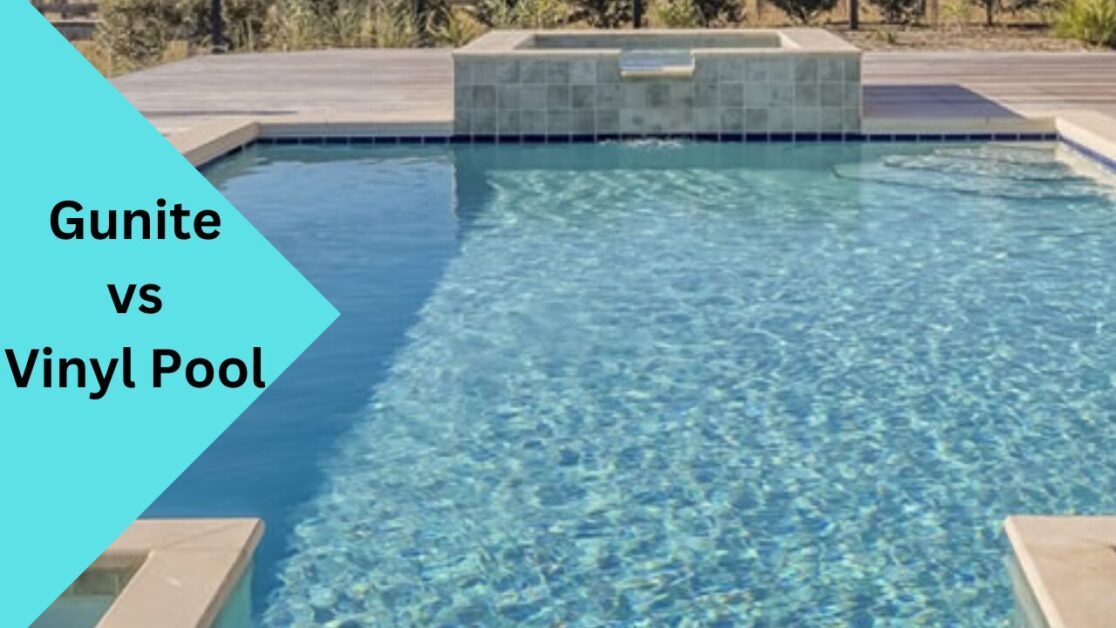When it comes to building the perfect backyard oasis, one of the key decisions you’ll face is choosing between a gunite and vinyl pool. Both options have their merits, but understanding the differences and benefits of each will ultimately help you make an informed choice. In this blog post, we will delve into the world of gunite and vinyl pools, exploring their similarities, differences, cost considerations, and even some upgrade options. So, let’s dive right in and explore the pros and cons of gunite and vinyl pools!
- Understanding Gunite and Vinyl Pools
- The Key Differences between Gunite and Vinyl Pools
- Exploring the Pros and Cons of Gunite and Vinyl Pools
- Upgrading and Conversion Options: Can You Convert a Vinyl Pool to Gunite?
- Adding a Spa to Your Pool: Is It Possible and How Much Does It Cost?
- Reshaping Your Gunite Pool: A Look at the Possibilities
- Conclusion
Understanding Gunite and Vinyl Pools
Before we explore the differences between gunite and vinyl pools, let’s take a moment to understand what each option entails.
Gunite Pools
A gunite pool, also known as a concrete pool, is constructed by spraying a mixture of concrete and sand onto a framework of steel rebar. This process creates a solid and durable pool structure that can be shaped according to your preferences. Gunite pools offer endless design possibilities, allowing you to create unique shapes, custom features, and stunning waterfalls.To explore more details and considerations regarding Gunite Pools our comprehensive guide What Are Gunite Pools – Unveiling the Wonders has you covered.
Vinyl Pools
In contrast, a vinyl pool is constructed using a flexible vinyl liner that is installed into a pre-formed pool structure made from materials like steel, aluminum, or polymer. The vinyl liner provides a watertight seal, giving the pool its shape and structure. While the design options may be more limited compared to gunite pools, vinyl pools still offer a variety of sizes, shapes, and finishes to suit your needs.
The Key Differences between Gunite and Vinyl Pools
Now that we have a basic understanding of gunite and vinyl pools, let’s compare them in terms of several key factors:
-
Durability and Longevity
- Gunite pools: Known for their durability, gunite pools can withstand the test of time. The concrete structure is highly resistant to punctures and can tolerate extreme weather conditions.
- Vinyl pools: Vinyl pools generally have a shorter lifespan compared to gunite pools. The vinyl liner may need to be replaced every 10 to 15 years, depending on its level of maintenance and exposure to the elements.
-
Customization and Design Options
- Gunite pools: Considered the ultimate choice for customization, gunite pools offer unparalleled design options. From freeform shapes to custom features like waterfalls, spas, and intricate mosaic tiles, the possibilities are endless.
- Vinyl pools: While not as flexible as gunite, vinyl pools still offer an array of shapes, sizes, and finishes to suit different tastes. However, customization options are more limited, as the vinyl liners are pre-fabricated.
-
Cost Considerations
- Gunite pools: The initial construction cost of a gunite pool tends to be higher compared to vinyl pools due to the materials and labor involved. However, over the long term, gunite pools may require fewer repairs and replacements, which can offset the initial investment.
- Vinyl pools: Vinyl pools are generally more affordable upfront, making them a popular choice for budget-conscious homeowners. However, it’s important to consider long-term costs, such as liner replacements, which can add up over time.
-
Maintenance and Repairs
- Gunite pools: While gunite pools offer excellent durability, they may require more maintenance compared to vinyl pools. Regular maintenance tasks include brushing the walls, resealing the surface, and potential retiling as needed.
- Vinyl pools: Vinyl pools have a smooth surface that is resistant to algae growth, making them easier to clean and maintain. However, the vinyl liner may need periodic patching or replacement due to wear and tear.
Exploring the Pros and Cons of Gunite and Vinyl Pools
To help you make a more informed decision, let’s dive deeper into the pros and cons of both gunite and vinyl pools.
Pros of Gunite Pools:
- Customizable: Gunite pools offer unparalleled design options, allowing you to create a truly unique backyard oasis.
- Durability: The solid and sturdy structure of gunite pools ensures long-lasting resilience against various external factors.
- Value: Gunite pools are often considered a valuable investment that can enhance the overall value of your property.
Cons of Gunite Pools:
- Higher initial cost: The construction of gunite pools involves higher upfront costs compared to vinyl pools.
- Maintenance requirements: Gunite pools may require more regular and thorough maintenance tasks to keep them in optimal condition.
- Longer construction time: Building a gunite pool typically takes longer due to the complexities involved in the construction process.
Pros of Vinyl Pools:
- Affordability: Vinyl pools are generally more cost-effective upfront, making them an attractive option for homeowners on a budget.
- Smooth surface: The smooth and non-porous surface of vinyl pools makes them resistant to algae growth, saving you time and effort in maintenance.
- Comfortable: The vinyl liner provides a softer and more comfortable surface to walk or sit on compared to the rough texture of concrete.
Cons of Vinyl Pools:
- Limited customization: The design options for vinyl pools are more limited compared to gunite pools, as the liners are pre-fabricated.
- Lifespan of the liner: The vinyl liner in a pool will eventually need replacement, which can be an additional cost to consider.
- Susceptible to punctures: Unlike the solid concrete structure of gunite pools, vinyl pools are more prone to punctures from sharp objects or accidental damage.
Upgrading and Conversion Options: Can You Convert a Vinyl Pool to Gunite?
One common question that arises is whether it is possible to convert a vinyl pool to gunite. The good news is, in most cases, it is indeed possible to convert a vinyl pool to a gunite pool. However, it’s important to consult with a professional pool contractor who can assess the existing pool structure and determine the feasibility of the conversion. They will consider factors such as the condition of the pool’s foundation, the plumbing system, and any potential obstacles that may affect the conversion process.
While the conversion from vinyl to gunite can be a complex and costly endeavor, many homeowners opt for it to access the myriad design possibilities and enhanced durability that gunite pools offer. The process typically involves removing the vinyl liner, reinforcing the existing structure with steel rebar, and applying the gunite mixture to create a brand-new pool. Keep in mind that the exact steps may vary depending on the specific pool and its condition, so it’s crucial to consult a professional before proceeding with any conversion project. To explore more details and considerations regarding Converting Vinyl Liner to Gunite, our comprehensive guide on How Much Does It Cost To Convert A Vinyl Liner Pool To A Gunite Pool? has you covered.
Adding a Spa to Your Pool: Is It Possible and How Much Does It Cost?
If you’re looking to elevate your pool experience by adding a spa, you’ll be pleased to know that it is possible to incorporate a spa into both gunite and vinyl pools. However, the process and associated costs may differ depending on the pool type.
When it comes to gunite pools, the versatility of construction allows for the seamless integration of a spa. You can customize the placement, size, and features of the spa according to your preferences. The cost of adding a spa to an existing gunite pool can vary significantly depending on factors such as the complexity of the design, local labor costs, and the specific features you choose.
For vinyl pools, adding a spa can also be achieved, although the options may be somewhat limited compared to gunite pools. Vinyl pool spas typically come in pre-fabricated designs that can be incorporated into the pool structure. The cost considerations for adding a spa to a vinyl pool are similar to gunite pools, with factors like the complexity of the design and labor costs influencing the overall expense.
To get a better understanding of the cost, you can consult with a pool contractor who can provide a customized quote based on your specific requirements and pool type. Additionally, factors like location, materials used, and any additional features or amenities can further impact the overall cost. Keep in mind that it’s essential to work with a reputable and experienced pool contractor to ensure a successful and safe spa addition.
Reshaping Your Gunite Pool: A Look at the Possibilities
One of the advantages of gunite pools is the ability to reshape them, should you desire a change in design or layout. Whether you want to update the shape, enlarge the pool, or incorporate new features, gunite pools offer flexibility and adaptability.
To reshape a gunite pool, you’ll need the expertise of a pool contractor who specializes in pool remodeling and renovation. They will assess the existing pool structure, take into account your desired changes, and provide a tailored solution to achieve your vision.
The process of reshaping a gunite pool typically involves draining the pool, demolishing or adjusting the existing pool walls, and applying the necessary modifications to create the desired shape and design. It may also involve updating filtration systems, adding new features such as waterfalls or slides, and resurfacing the pool with a new finish.
The cost of reshaping a gunite pool can vary significantly depending on the extent of the changes, the size of the pool, and the specific design elements involved. It’s crucial to consult with a pool contractor who can provide a detailed cost estimate based on your unique requirements.
Conclusion
Choosing between a gunite and vinyl pool is a major decision that will significantly impact the enjoyment and value of your backyard. By understanding the key differences, pros and cons, and options for customization, you can make an informed choice that aligns with your preferences and budget.
While gunite pools offer unparalleled design possibilities and long-term durability, they come with a higher upfront cost and maintenance requirements. On the other hand, vinyl pools offer affordability and ease of maintenance, but their customization options may be more limited, and the vinyl liner will require periodic replacement.
If you already have a vinyl pool and desire the flexibility and customization of a gunite pool, conversion is often possible, albeit with greater cost and complexity. Adding a spa to your pool is achievable for both pool types, with gunite pools offering more versatility in design. Reshaping a gunite pool is also a feasible option, allowing you to update the shape and features to suit your changing preferences.
Ultimately, your decision should take into account your budget, design preferences, long-term maintenance considerations, and the advice of a trusted pool contractor. With proper planning and expert guidance, you can create the perfect backyard oasis that brings joy, relaxation, and lasting memories for years to come.

Greetings, fellow pool enthusiasts! I’m Turner Davis, your dedicated guide to the world of pool care and maintenance. With over a decade of experience in the field, I’ve made it my mission to transform ordinary pools into extraordinary aquatic retreats.

